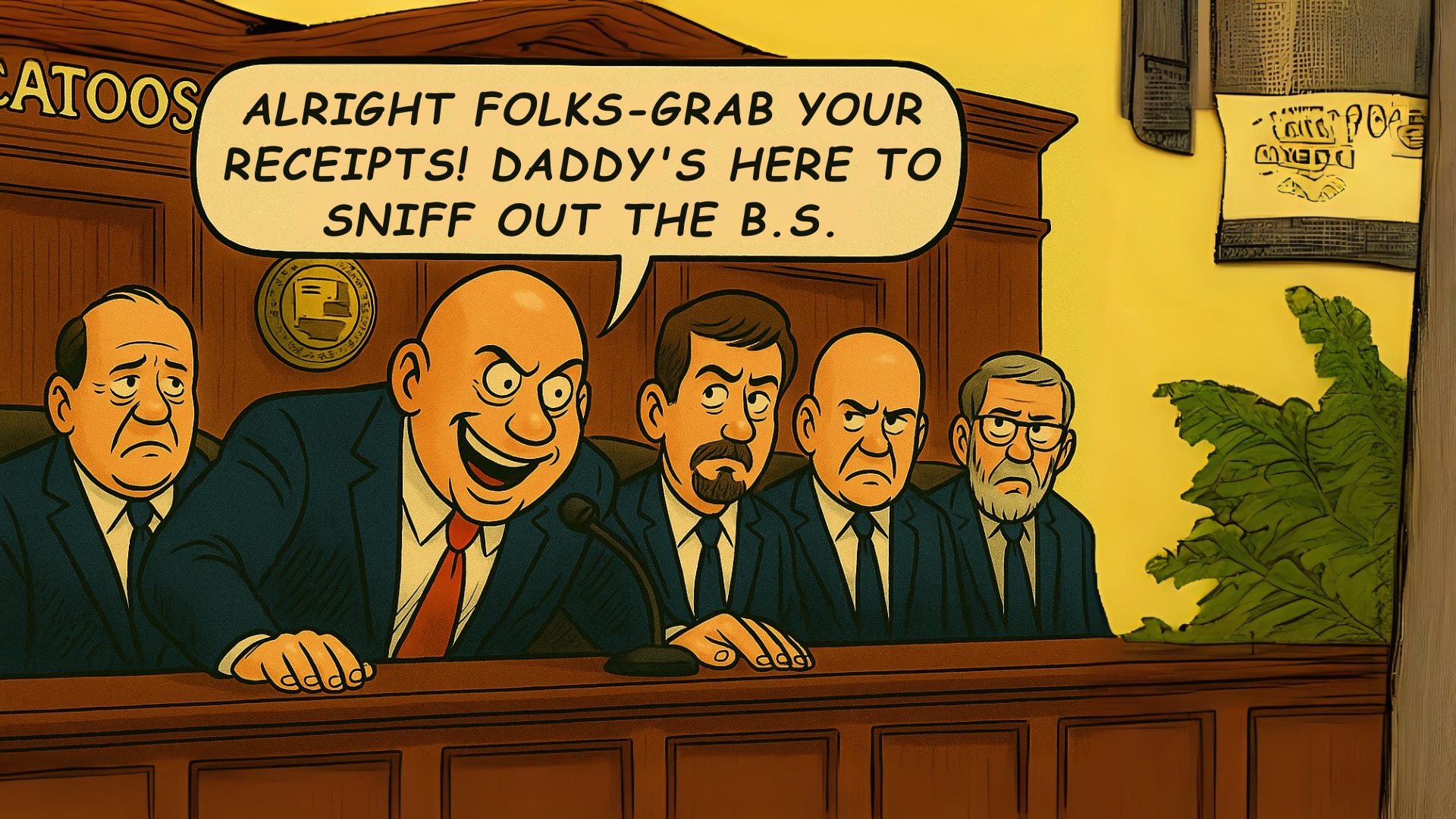Alright Folks, Grab Your Receipts—A Budget Awakening in Catoosa County?
Wait, what?
Well, I tuned in for what I thought would be a routine Catoosa County budget work session—you know, the kind where 99% of the audience seats are empty and yawns are contagious. But instead of the usual lullaby of nodding heads and predictable pitches, what we got was a surprising twist. Imagine expecting a routine nap and getting a front-row seat to a second-rate roast (maybe third-rate, this is still government).
Let me set the stage: Budget meetings are typically government at its most boring and mind-numbing. These sessions are designed less for discovery and more for the ceremonial public unveiling of numbers already circulated, debated, and quietly agreed upon via emails and informal processes. Most times, these gatherings serve as a formality—an annual review that, yes, indeed, government continues to function and your tax dollars are hard at work funding, well, everything.
So, Catoosa County’s first budget work session of the year kicked off as expected: calm, cordial, and filled with department heads and constitutional officers ready to present their requests. District Attorney Clay Fuller was first up. Full disclosure: I am a Clay Fuller fan. He’s brilliant, experienced, and not one to break a sweat. His budget request was persuasive, concise, and reasonable. You could feel the room settling in for the familiar rhythm.
Then, enter the freshman county commissioner from District Three, Richard Tharpe. It was his first-ever budget season rodeo, his first time sitting at the dais for the annual “Here’s What We Want” tour. He listened politely, nodded, and then calmly asked a question that signaled this was different.
It wasn't a hostile "gotcha" moment, but it was direct. He effectively said,
“That’s a real nice budget request you’ve got there, Mr. DA. . . . .
Be a damn shame if someone took out a blowtorch and some pliers to it and asked what you’d cut from it.”
That isn’t what he said, of course. His actual question (and one he would repeat some version of to every presenter on the agenda) was more along the lines of:
"If you had to cut this request to its bare minimum—and I mean bare bones, survival-mode minimum—what would that look like? Where would you start cutting?"
Now imagine you're the DA. You’ve just made your case. You’ve presented your numbers. You’ve done this before; it’s usually easy sailing. And here comes this new commissioner asking you to start throwing things overboard from your own funding request. For a moment, Fuller looked like someone had handed him a hacksaw and ordered him to choose his least favorite limb.
As anyone who knows District Attorney Fuller knows, he handled it with grace. But it wouldn’t be a surprise if other department heads in the hallway started Googling “believable excuses to reschedule your budget presentation.” Not because the questions were unfair, but because they were unexpected. It’s not every day someone asks you to carve up your own request right out of the gate.
If I were one of the department heads still waiting in the hallway? I’d have developed a sudden limp. Sprained ankle. Unexplained dental emergency. Anything to buy a day’s reprieve.
Now, let me be clear: this wasn’t some staged ambush, and Tharpe wasn’t alone in taking the process seriously. The other commissioners—veterans who’ve been through their share of budget rounds—were measured, thoughtful, and attentive throughout. There’s no doubt they care about being good stewards of public funds. And frankly, the whole board deserves credit for allowing real and sometimes tough questions to surface and be explored in public, not squashed behind the scenes.
But Tharpe did bring something new to the table—a laser focus on the taxpayer and a desire for proactive scrutiny. He brought a different energy. It wasn’t loud. It wasn’t rude. It was something even rare in government: curious and unsatisfied. It was very much like he set out with a mission to relentlessly avoid a term coined by Milton Friedman, The Tyranny of the Status Quo. If he keeps this up, he will.
Catoosa County didn’t get a budget brawl. It got a budget awakening.
If you missed it, I think I can sum it up with a succinct mental image. Picture this: Tharpe rolls in with aviators on and some Top Gun theme song playing in the background, adjusts his mic, and (at least in spirit) says,
“Alright folks, grab your receipts. Daddy’s here to sniff out the B.S.”
But, let’s not get carried away. Tharpe didn’t single-handedly revolutionize local government in one meeting. He didn’t flip tables or propose slashing budgets with reckless abandon.
And here’s where we pull back from the fun hyperbole: No one should think Tharpe is going to be like a local government version of Gordon Ramsay on an episode of Kitchen Nightmares. Frankly, that would be entertaining but not what Catoosa County needs.
What it needs—and what Tharpe seems to be aiming for—is something more like fine-tuning. As I wrote earlier this year when the commissioners first took office, they’re driving a Ferrari. The county is in solid shape. All they have to do is avoid burning out the clutch and keep it in gear. But if Tharpe’s approach at this budget work session is any indication, he’s interested in more than just keeping the car on the road. He’s looking under the hood, identifying inefficiencies, and figuring out how to make this thing perform at its absolute best.
For taxpayers, that’s something to take note of. Whether this was a one-off moment or the start of a new normal remains to be seen. There are more budget work sessions ahead, and the official hearings in August will provide ample opportunity for Tharpe—and perhaps others—to continue this approach or explore greater accountability. But even if this was just a glimpse, it’s a promising one. Might be worth tuning in.
An aside: Have you ever seen a ledger for local government?
While we’re on the subject of oversight, let’s talk about something almost no one—elected officials or residents—gets to see: a ledger with transaction-level details of how public funds are spent. That’s right. Not a single commissioner or taxpayer has access to a full, itemized breakdown of where the money goes.
Think about that for a second. In a world where you can track every penny of your own bank account from your phone, the public can’t access their government’s spending at the same level of transparency. It’s not just a Catoosa problem—it’s true across the state, as I wrote in this article recently. And it’s as wild as it sounds.
Imagine trying to run a business—or your household—without being able to look at your own receipts. That’s essentially what’s happening here. If we’re serious about accountability, then asking tough questions at budget work sessions is a step in the right direction. But until officials and the public can see those transaction-level details, the process will always be missing a critical piece.
Read my article discussing this and what to do about it below.
DOGE Dreams and Georgia Data Nightmares
You know an idea has legs when it jumps from fringe experiment to national movement in less than a year—and the Department of Government Efficiency (DOGE), brainchild of Elon Musk, has done just that. Equal parts disruption and branding genius, DOGE has captivated(or enraged) a public fed up with bureaucratic bloat and addicted to transparency.




